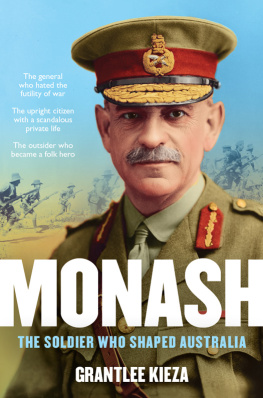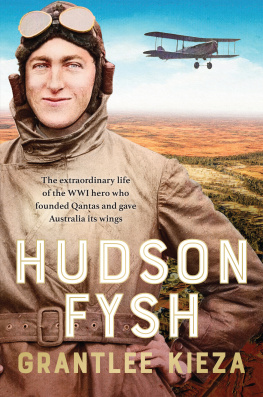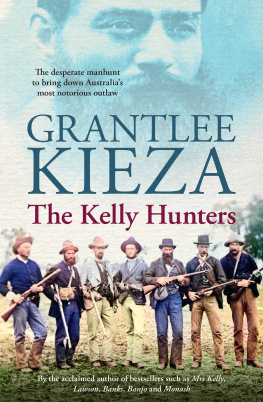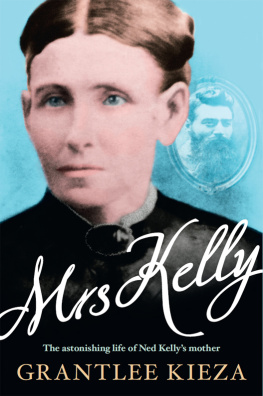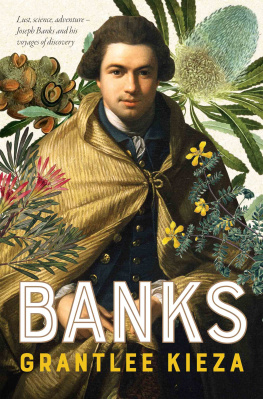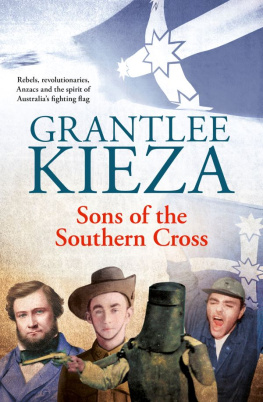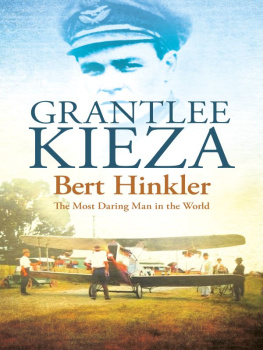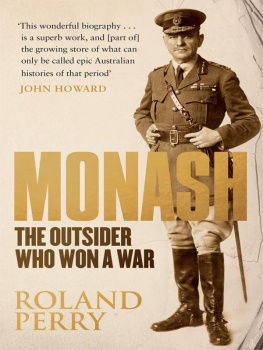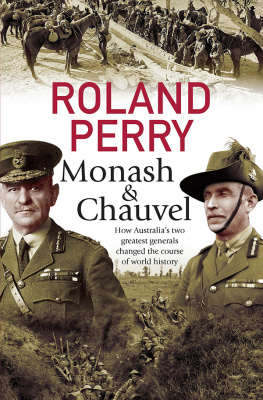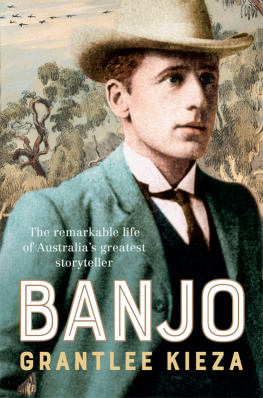Grantlee Kieza - Monash
Here you can read online Grantlee Kieza - Monash full text of the book (entire story) in english for free. Download pdf and epub, get meaning, cover and reviews about this ebook. year: 2015, publisher: HarperCollins Publishers, genre: Home and family. Description of the work, (preface) as well as reviews are available. Best literature library LitArk.com created for fans of good reading and offers a wide selection of genres:
Romance novel
Science fiction
Adventure
Detective
Science
History
Home and family
Prose
Art
Politics
Computer
Non-fiction
Religion
Business
Children
Humor
Choose a favorite category and find really read worthwhile books. Enjoy immersion in the world of imagination, feel the emotions of the characters or learn something new for yourself, make an fascinating discovery.
- Book:Monash
- Author:
- Publisher:HarperCollins Publishers
- Genre:
- Year:2015
- Rating:3 / 5
- Favourites:Add to favourites
- Your mark:
- 60
- 1
- 2
- 3
- 4
- 5
Monash: summary, description and annotation
We offer to read an annotation, description, summary or preface (depends on what the author of the book "Monash" wrote himself). If you haven't found the necessary information about the book — write in the comments, we will try to find it.
Monash — read online for free the complete book (whole text) full work
Below is the text of the book, divided by pages. System saving the place of the last page read, allows you to conveniently read the book "Monash" online for free, without having to search again every time where you left off. Put a bookmark, and you can go to the page where you finished reading at any time.
Font size:
Interval:
Bookmark:
For my father, Adam Kieza
- Cover
I would name Sir John Monash as the best general on the Western Front in Europe; he possessed real creative originality, and the war might well have been won sooner, and certainly with fewer casualties, had Haig been relieved of his command and Monash appointed to command the British armies in his place.
F IELD M ARSHAL B ERNARD M ONTGOMERY , C HIEF OF THE I MPERIAL G ENERAL S TAFF 1946 to 1948
I am convinced that there are no troops in the world to equal the Australians in cool daring, courage and endurance.
J OHN M ONASH, WRITING TO HIS WIFE FROM G ALLIPOLI
T HE KINGS CONQUERING HERO stands outside the most magnificent palace in the world, and rubs a forefinger across his thick salt-and-pepper moustache. He sticks out his aristocratic jaw and takes a deep gulp of the cold, crisp night air. Ever so slowly, Lieutenant General Sir John Monash breathes in the stunning sight before him, both the tranquillity and the splendour, as the biting breeze on this cold London night slaps him hard across the face.
A man of medium height with a large nose, swarthy skin and dark penetrating eyes, he has lost the businessmans paunch of younger days and now, at 53 and dressed in the uniform of Australias supreme military commander, he looks as fit as he did when he cut a swathe through the fashionable young ladies of Melbourne 30 years earlier. His boots gleam with a mirror finish and his peaked officers cap covers his thinning, tawny-grey hair. His face is heavily lined and creased, but that only adds to his reputation as an intellectual. Ever since he was a small boy herding goats in the Australian bush, this son of German-speaking Jews has dreamed of such glory for himself, such public reward for his hard work and sacrifice. Now he has played a leading role in the destruction of the German Army and is about to dine with the King and Queen of England, the President of the United States and some of the most famous figures in history. For so long, all through the horrors of the past few years, Monash has had a furrow carved deep into his brow, but on this cold night, as his breath escapes in a cloud of vapour, his face displays only wide-eyed awe.
Four years earlier, having never seen a shot fired in anger, he was sitting behind a desk at his engineering firm in Melbourne, the years of hard work and struggle having at last opened the door to a comfortable life in one of Melbournes grandest homes. Swept up in the bloody whirlpool of the Great War, his first taste of military action was the massacre at Gallipoli yet now he is being lauded as the greatest living Australian, and one of historys most astute military tacticians.
It takes a few moments for Monash to comprehend the magnificence of the occasion and the opulence of the royal residence, surrounded as it is by a carpet of white frost. Golden lights in every window make the enormous building glisten like a treasure chest. As he enters Buckingham Palace, Monash nods towards Winston Churchill and Rudyard Kipling among the other dinner guests drinking in the moment.
He speaks briefly to some of the assembled dignitaries, the Prime Ministers of Britain, South Africa and Australia. The guttural vowels that once betrayed his German ancestry have long gone. Monashs world has been one of mud and blood and death ever since he landed at Anzac Cove in 1915, to first experience a war that became the first truly global conflict. He has risen from weekend soldier to command more than 200,000 Australian, British, Canadian and American troops, and British Prime Minister David Lloyd George says he has become the most resourceful general in the entire British Army.
Seventeen million lives, among them 62,000 Australian, have been lost in the fighting, and another 20 million men, women and children have been left mutilated and maimed. In less than half a decade, ancient kingdoms have crumbled, empires have been destroyed, dynasties toppled. Within 10 years, war has changed from hand-to-hand combat to aerial bombardment and artillery fire that can destroy targets more than 100 kilometres away.
No wonder that when the Armistice was signed in a railway carriage in a French forest just six weeks ago, on 11 November 1918, men and women around the globe danced in the streets, waving flags and hats, free at last from the shackles of fear.
Now, in Monashs home city of Melbourne, department stores are revelling in the post-war euphoria as a populace giddy with excitement and optimism ticks up sales records. and there is exhilaration everywhere now that the bloodletting and the bloodlust are over.
Monash knows, though, that the end of hostilities has only brought about a fragile peace. Famine and pestilence strain at the leash and political unrest bubbles.
The Spanish flu, accelerated by massive troop movements and the close proximity of soldiers weakened by malnourishment and war, has already started to infect 50 million people. It will soon kill twice that number.
But these are all problems to be addressed at a later time. For now, Monash steps out of the cold London night and into the grandeur of the palace.
He strides forth with the same resolute air, the same forceful bearing that have propelled him past all the other career army officers to command the Australian Corps on the Western Front. Throughout his life he has been as impervious to opposition as the tanks so instrumental in his victories: a great rumbling machine that sweeps aside all before him. He has picked himself up from every blow aimed at him, whether from a jealous husband or from the most powerful army ever assembled. Now Monash marches towards the new rulers of the world with the confident bearing of a military commander who has destroyed all opposition at Hamel, Amiens, Mont St Quentin and the Hindenburg Line.
Yet here in the palace even Monash has to shorten his stride, agog at what he regards as the unsurpassed brilliancy of this State banquet. He walks into a spacious corridor leading to the State Rooms and reacquaints himself with many of the 117 invited dignitaries who are making small talk about the biggest decisions ever considered on earth. The Ministers of the Cabinet, the Ambassadors of France, Italy, the United States, Spain and Japan, all dressed in top hats and tails, stand chatting about the Peace Conference at Versailles that is due to start in three weeks and which will apportion the crushed remains of the conflict among the victors.
The other military men are all in uniform. Monash greets one of his greatest supporters, Field Marshal Douglas Haig, commander-in-chief of the British forces, who is standing with two of his generals, William Robertson and Henry Wilson, and Admirals John Jellicoe, David Beatty and Rosslyn Wemyss.
Nearby are Randall Davidson, the Archbishop of Canterbury, the Indian statesman Satyendra Sinha and the Maharaja of Bikaner, Ganga Singh, the only non-white member of the British Imperial War Cabinet. Billy Hughes is here too; the Prime Minister of Australia and self-styled Little Digger has always been wary of Monashs astonishing rise.
The Kings guests mingle for 10 minutes before costumed officers of the palace lead them into the White Drawing Room. Here, amid the breathtaking luxury, wait King George V, Queen Mary and some of their children, Princes Henry and George
Monash waits his turn to shake hands with the President and the King. It was only four months ago, near Villers-Bretonneux in France, that he knelt before His Majesty as the King placed a sword upon Monashs shoulder and invested him with his knighthood. He was the first soldier to be given this honour on the battlefield in two centuries.
Font size:
Interval:
Bookmark:
Similar books «Monash»
Look at similar books to Monash. We have selected literature similar in name and meaning in the hope of providing readers with more options to find new, interesting, not yet read works.
Discussion, reviews of the book Monash and just readers' own opinions. Leave your comments, write what you think about the work, its meaning or the main characters. Specify what exactly you liked and what you didn't like, and why you think so.

